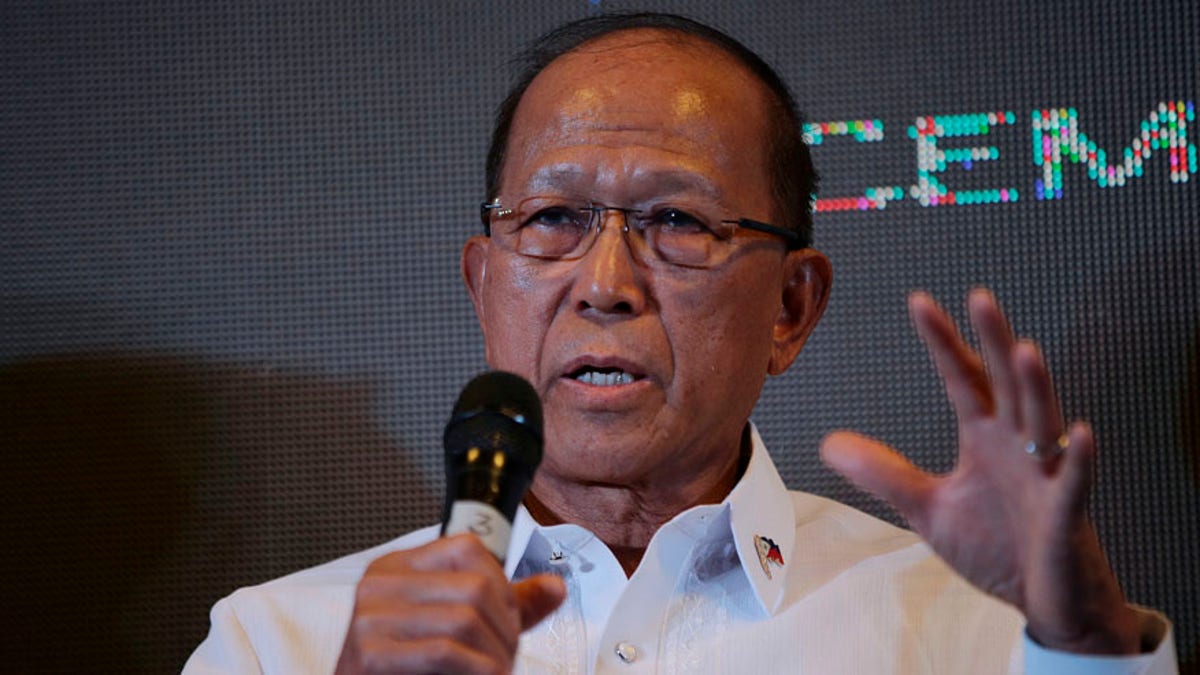
Philippine Defense Secretary Delfin Lorenzana gestures during a conference in Makati, south of Manila, Philippines on Thursday, Dec. 8, 2016 (AP Photo/Aaron Favila)
MANILA, Philippines – The Philippine defense secretary said Thursday it is highly unlikely his country will allow the U.S. military to use it as a springboard for freedom of navigation patrols in the disputed South China Sea to avoid antagonizing China.
Delfin Lorenzana said U.S. ships and aircraft could use bases in Guam, Okinawa or fly from aircraft carriers to patrol the disputed waters.
Under President Rodrigo Duterte's predecessor, Benigno Aquino III, some U.S. aircraft and ships stopped in the Philippines on the way to patrolling the disputed waters to challenge China's territorial claims.
Duterte, who took office in June, has taken steps to mend ties with China and became hostile toward the Obama administration after it raised concerns over Duterte's deadly crackdown on illegal drugs.
Asked if the Philippines will continue to host U.S. ships and aircraft patrolling the disputed waters, Lorenzana said Duterte will not likely allow that to happen "to avoid any provocative actions that can escalate tensions in the South China Sea. It's unlikely."
"We'll avoid that for the meantime," Lorenzana said. "Anyway, the U.S. can fly over there coming from other bases."
U.S. officials did not comment immediately. The commander of U.S. forces in the Pacific, Adm. Harry Harris, said last month that despite Duterte's rhetoric, military cooperation with Manila has not changed.
Duterte has publicly threatened to scale back the Philippines' military engagements with the U.S., including scuttling a plan to carry out joint patrols with the U.S. Navy in the disputed waters, which he said China opposes.
U.S.-Philippine annual combat exercises have been reduced and will be redesigned to focus on disaster response and humanitarian missions. Among the maneuvers to be dropped starting next year are amphibious landing exercises and beach raids aimed at enhancing the country's territorial defense, military officials said.
More News...
Duterte's actions have become a hindrance to U.S. efforts to reassert its presence in Asia, although the U.S. military has vowed to continue patrolling one of the world's busiest commercial waterways.
After Duterte met Chinese President Xi Jinping in Beijing in October, China allowed Filipinos to fish at disputed Scarborough Shoal. China took control of the rich fishing area in 2012 after a tense standoff with Philippine government ships.
Philippine coast guard ships have also resumed patrols at the shoal.
Aside from the easing of tensions at Scarborough, Chinese coast guard ships are no longer blocking Philippine resupply ships from Second Thomas Shoal, farther south in the Spratlys, Lorenzana said.
Lorenzana said he and his Chinese counterpart agreed in October, during Duterte's trip to China, to resume exchanges of defense observers and students under a 2004 agreement. The exchanges were suspended in 2012 when the Philippines brought its territorial disputes with China to international arbitration under Aquino's presidency, angering Beijing, he said.
China has also inquired if it can supply armaments to the Philippines, he said.
China can further expand its influence in the region if U.S. President-elect Donald Trump pursues an isolationist foreign policy, former Philippine Foreign Secretary Albert del Rosario said.
"If the U.S. relinquishes (its) leadership posture in terms of the region, that vacuum will be quickly filled by our northern neighbor," del Rosario said.